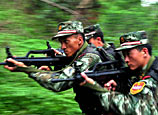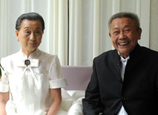
ISLAMABAD, July 5 (Xinhua) -- Afghanistan and Pakistan are again involved in a blame game at a time when their cooperation is urgently needed to push for the elusive peace and reconciliation process in war-torn Afghanistan.
Senior Afghan civilian and military leaders have accused Pakistan of sheltering senior Afghan Taliban leaders who are pursuing their armed attacks in Afghanistan. Pakistan has denied the charges and has insisted that it supports the peace process.
The fresh statement came from Afghan Army Chief, General Sher Mohammad Karimi, on Wednesday when he said that Pakistan controlled and gave shelter to Afghan Taliban leaders who have continued to unleash its fighters in Afghanistan. General Karimi told the BBC that fighting in Afghanistan could be stopped "in weeks" if Pakistan tells the Taliban to end the insurgency.
Pakistan was quick to reject Gen. Karimi's allegations, saying that these are "totally fabricated accusations" and another attempt to malign the country. Pakistan Foreign Ministry spokesman Aizaz Ahmed Chaudhry said that Islamabad has exercised extreme restraint in the face of what he called "highly provocative language" used by Afghan civil and military officials over the last few months.
Days earlier, Afghan Deputy Foreign Minister Ershad Ahmadi claimed that Pakistan has advised the Afghan government to share power with the Taliban as part of a peace talks "end game."
"We believe this federalism is a means for the Pakistanis to achieve what they could not achieve through their proxy (the Taliban) on the battlefield," Ahmadi said in an angry reaction in Kabul on Monday.
In Islamabad, Chaudhry dismissed Ahmadi's claim as baseless and said no such proposal was made to the Afghan authorities.
At a press conference in Kabul with British Prime Minister David Cameron over the weekend, President Hamid Karzai said that efforts have been made over the past six months to impose federalism on the people of Afghanistan through the Taliban or by handing over one or two places to the militant group under a power- sharing scheme.
"We have heard rumors from Pakistan as well and have reports that they have made efforts in this respect. I do not know what Pakistan's interest is in it, because such a situation in Afghanistan will mostly be unfavorable for Pakistan," Karzai said.
The opening of the Taliban office in Qatar on June 18 was also viewed in Kabul as a "conspiracy" involving foreign countries. In his weekly radio address late last month, President Karzai said that his government is frustrated with the "conspiracies by foreigners" against Afghanistan through the Qatar office.
Although Pakistan has insisted that its only role was to facilitate the Qatar peace process, Kabul remained unconvinced about this claim, widening the mistrust between the two neighbors.
Karzai also objected to the raising of Taliban's white flag in its Qatar office and a plaque bearing the words "Islamic Emirate of Afghanistan," which was the name given to the country during the Taliban rule. He viewed the Taliban office as an embassy and a parallel government in exile.
The long-awaited Taliban office had raised hopes for peace process. However, the controversy over the Taliban flag and the plaque have heightened tensions between Pakistan and Afghanistan and have dashed hopes for the success of the peace process.
The United States, its NATO allies and Afghans themselves believed that Pakistan has deep influence over the Afghan Taliban and can convince them to join the intra-Afghan dialogue.
Pakistan and Afghanistan have enough bilateral mechanism to discuss and resolve all issues diplomatically and by airing charges and counter-charges in the media would not help in confidence-building and in the prospects of achieving peace and stability in both countries.
















 'Prince's cool idea in summer': Carving on watermelon to boost sales
'Prince's cool idea in summer': Carving on watermelon to boost sales


![]()
